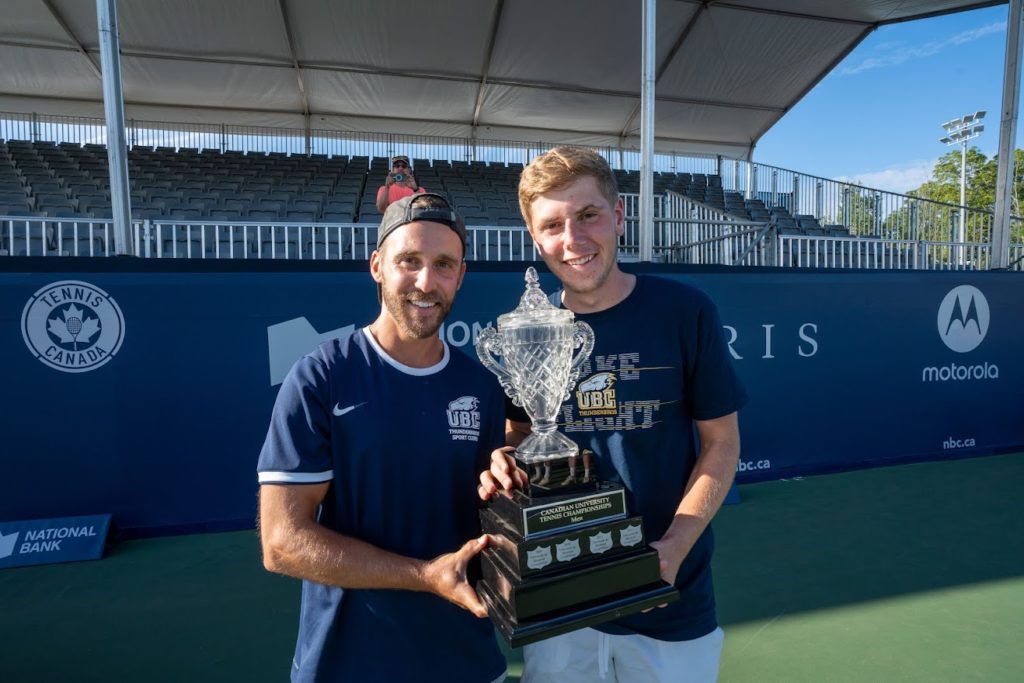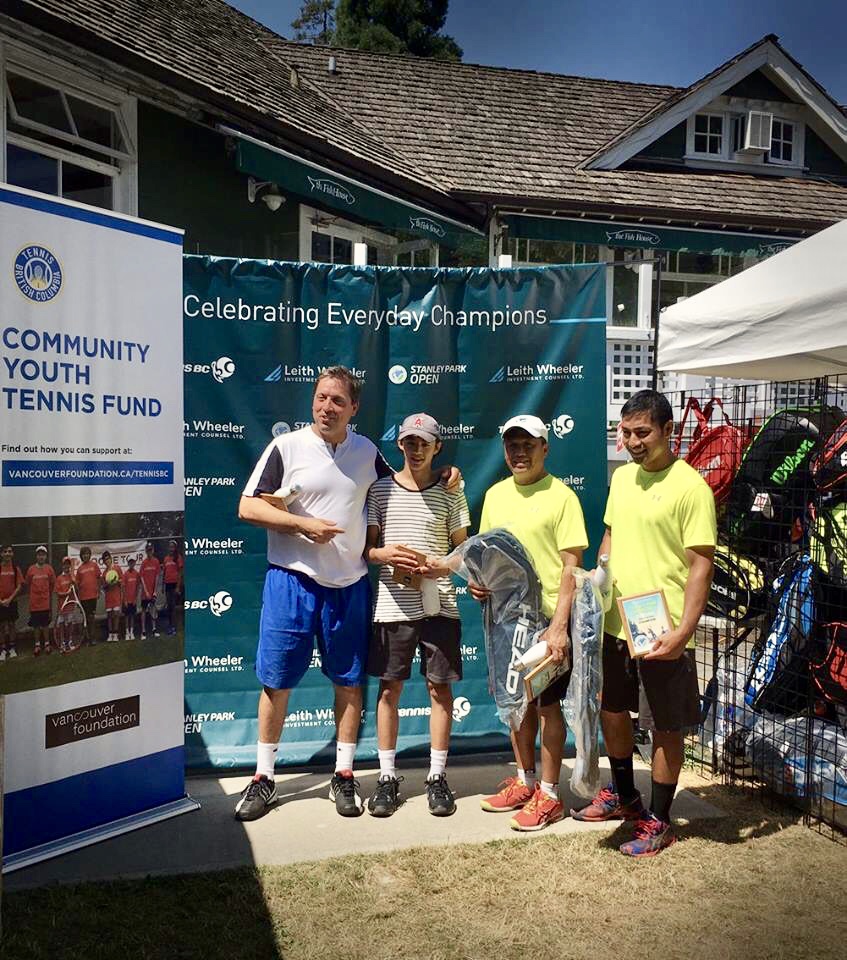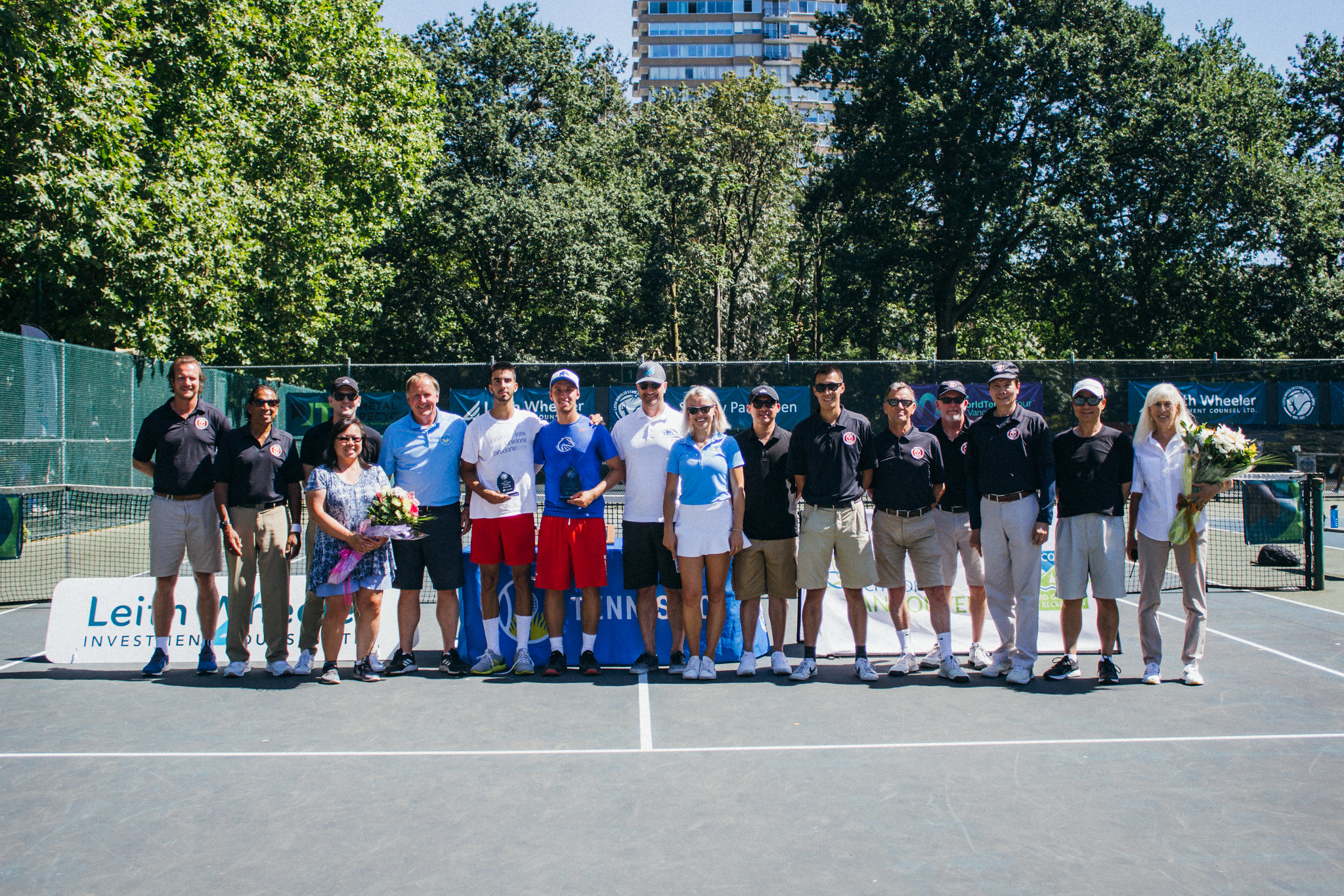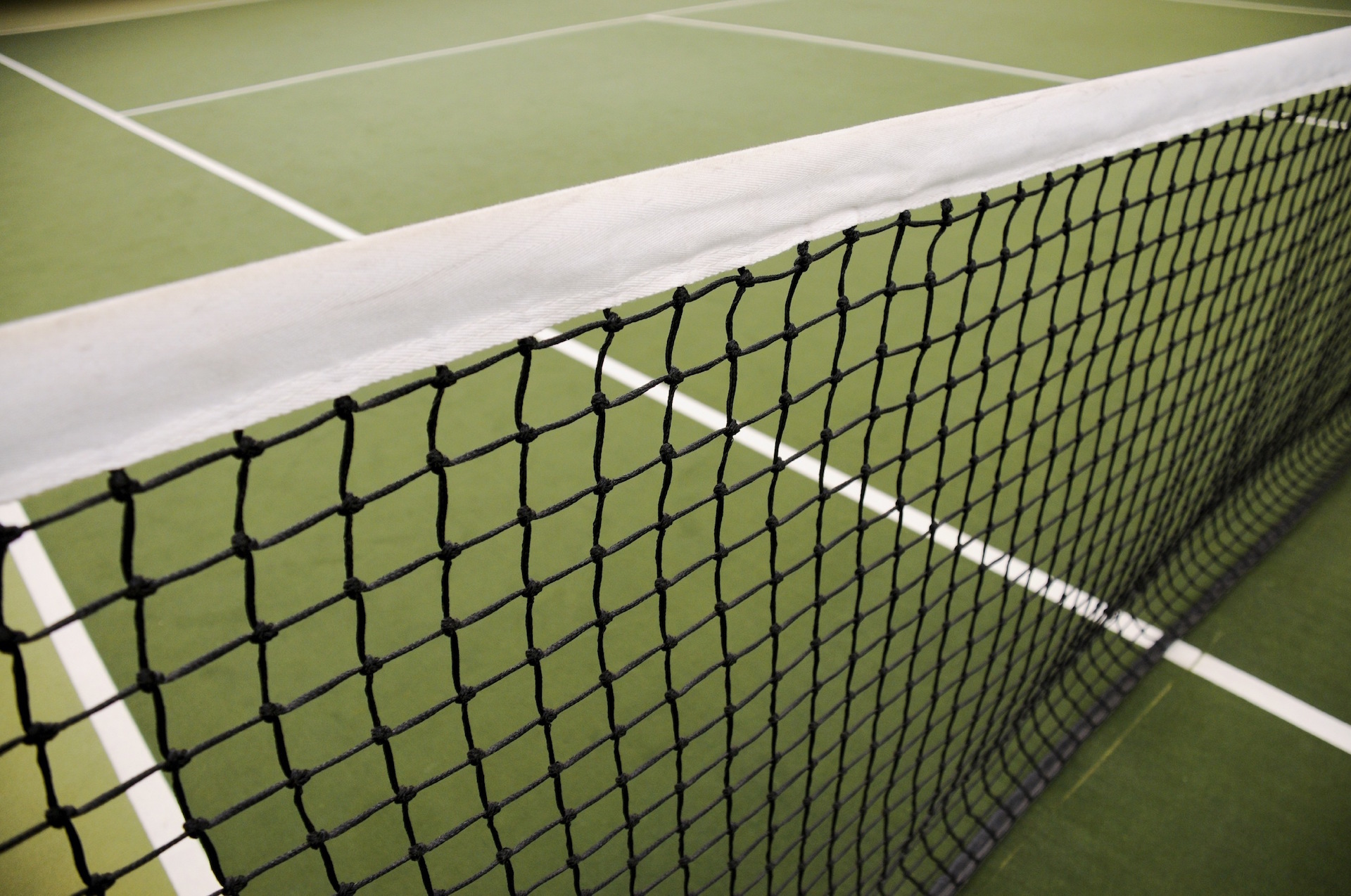
By Joanne Hill
The sports world is full of classic underdog stories—the ones that are made into Hollywood blockbusters that rely on exaggeration to create drama or at the very least, a lengthy training montage—think Rocky or The Karate Kid. A story worthy of a script treatment unfolded this August for the UBC Men’s Tennis team—no exaggeration needed.
Never tell them the odds!
Facing odds stacked against you can do one of two things; you accept defeat before you even begin to fight, or you find the fight to take on those odds—and that’s exactly the choice the UBC Men’s tennis team had to make.
Coach Barak Jacob played on the team for seven years—seven years of not getting past Westerns, always meeting up with their rivals, the University of Alberta, and always losing to them. The saving grace is that every single one of the players is there because they love to play—and they love being part of this team—winning Westerns was not why they were out there. After graduation, Barak had developed such a close bond with the other players that he chose to come back to coach
Band of brothers
To be fair, it’s an uneven competition from the word go. Alberta is a fully funded Varsity team and UBC’s team is a club—with relatively little funding from the university. While other Varsity tennis programs can recruit players from around the world, every single player in UBC’s lineup was BC raised. Players organize team fundraisers, competitions, recruiting, and marketing efforts just to be able to function as a club. They pay for court time, equipment and travel out of their own pockets and through fundraising—It brings a sharper edge to the trope of the starving student. Really, UBC’s team is a bunch of guys who want to play tennis.
For many of these players, tennis was an afterthought as they headed to post-secondary studies. Their love for the game was fading after years of competing in such a mentally draining individual sport, but together, they were able to light a fire under each other and find a renewed passion for tennis because they were playing for a greater purpose—each other.
Sometimes a change is the best thing. Barak is a coach in his own right, but he notes that the UBC Men’s Tennis team is coached with an approach more powerful than just improving skills and tactics— it’s an approach that is based on the power of friendship and the bond that grows between a band of brothers–it’s equally as powerful as any kind of physical training.
After curating an extremely high-quality and deep lineup, the team set themselves a goal: To beat U of A. They set out to be giant killers, and so, they knuckled down and focused on the task at hand.
Making your points count—one at a time
Of course, to get to Westerns final, which took place in March at UBC, the team had to get past a few other schools—namely SFU and UVic. So far, so good. And now to face down their arch nemesis—U of A in the final. It needs to be said here: U of A were National Champs in 2021—so this was no easy task they had set themselves—but with a lot of grit and determination, clutch performances, and some real self-belief, the UBC team achieved what had been the unachievable, taking down U of A in a nail biter of a match that was tied 3-3 before the final match up—and that came down to a 7-6 victory in the third set!
The team couldn’t believe it! They had done it! They had beaten U of A—and, it slowly dawned on them; they were going to Nationals!
Friends are the family you choose
Tennis great, Arthur Ashe once said, “Start where you are. Use what you have. Do what you can,” which is exactly what the UBC Men’s Tennis team now set out to do. Barak emphasizes that all the players in the lineup put in the effort over the summer, holding each other accountable as there were no organized team practices during that time—it was a long time to keep up their fitness too as Nationals weren’t till August—but each and every one of the players was willing to go the extra mile.
They all love tennis, there’s no question about that, but one thing that’s perhaps not quite as obvious, and one that is certainly not common is the bond that these guys share. Where most teams have one or two star players, UBC doesn’t–Barak admits that on paper, they might be described as average—there’s no constant standouts. Lineups are set on the day. But no stars means no egos. No one player thinks they are more important than any other—and when they do their team cheer, they aren’t yelling “Fight” or “Win,” they huddle and yell, “Family!” because that’s what they’ve become.
These players don’t just play tennis together—they hang out together—they’re all great friends—and through tennis, they’ve built bonds that go way beyond the court or the score—they play for something far more important than winning—they play for each other.
Some of this comes down to leadership, although Barak plays down his own importance in the team culture saying, “I can’t demand from my players if I don’t put in the effort.” His effort and the players’ is on par—they all give what they have. He made sure that the players were in peak condition; he set practice schedules, observed practice, and was there for the guys for whatever they needed in the weeks leading up to Nationals. Barak says, “I wanted them to know that somebody cares about this team, to create a sense of belonging and trust—which creates performance on court.”
The family that plays together stays together
A week before the Nationals, all 17 players flew out to get acclimatized to Toronto—it wasn’t just about the players who would see action—this was about the team as a whole—only seven would get to play. Other teams left many players behind and only brought their stars. “We went hoping to maybe win the first match up,” Barak says, “so we were in the best shape possible. We had a week of prep, and we enjoyed the moment and the big stage and were treated really well by the organizers of the event.”
The first test would be Western University—and the coaches of the big eastern varsity team were inclined to underestimate this group of club players from UBC. Afterall, they hadn’t even got past Westerns for the past seven years—probably just lucky!
Barak is the first to admit that it was tough! The atmosphere was electric—this was the biggest stage they had ever been on, and it was intimidating. It was hot, players’ muscles cramped, and the matches were long—but they beat Western, and suddenly, heads turned and people were talking! Who were these guys? They weren’t anything special! They weren’t even a varsity team—and they were through to the finals.
With a few wins behind them, they found themselves faced with an even greater challenge—but they had already done more than what they had set out to do—they had hoped to win one or two matches, but now this group of 17 players who had worked so very hard to be here knew that they had something. . . something really special to fight for.
A fight to the finish
When the day of the final came, it was to be the six-time past winners and the clear favourite, University of Montreal, against underdogs and surprise finalists, UBC. As so often happens in tennis, it’s who’s better on the day—and sometimes it comes down to something that has nothing to do with racquets or courts or balls. The UBC men were happy to be there—they knew that win or lose, they had already exceeded all expectations—they were going to go out on those courts and play—for each other.
Barak recalls that, “We got off to a rough start. We were down 3-0 but my team doesn’t play tennis with their racquets—they play with their hearts.” Whether it was the slightly scornful air coming from their opposition, or whether it was having nothing to lose, UBC’s players, cheered on by their teammates suddenly started to win. Point after point, game after game—till they were at 3-1, then 3-2, and then they drew level at 3-3.
Team tennis matches are all played almost simultaneously, and right nearby as they drew to 3-3, the match that would determine the whole thing was also nearly over. With what could only be described as pure elation, the UBC team were celebrating their victory at Nationals—that’s right—they won the whole thing.
Andre Agassi once said, “You’ll hear a lot of applause in your life, but none will mean more to you than that applause from your peers.” Every single player on the UBC men’s team can attest to that as the truth—they played not just for victory, but also for each other. Echoing Agassi, Barak said, “It was a huge victory, especially for an underfunded team and it proves that love is more important than skill. These guys don’t just play tennis to win—they play because they love it and through playing together, they‘re a family.”
You would think that they might have come home to a hero’s welcome—these giant killers certainly deserved one—but that was not the case. The pilot had announced their victory on the plane home and the UBC Women’s Tennis team was at the airport to greet them, but there was no real fanfare. They have plans to celebrate together now that they’re home—and they’ll do that as the tight knit group that they are.
Hopefully, this team gets the recognition they deserve—what they have accomplished is beyond remarkable—it’s a testament to the human spirit—of what can be achieved against the odds, and above all, it’s a testament to the power of creating a place where everyone is part of the whole and where love triumphs in a game of tennis.








